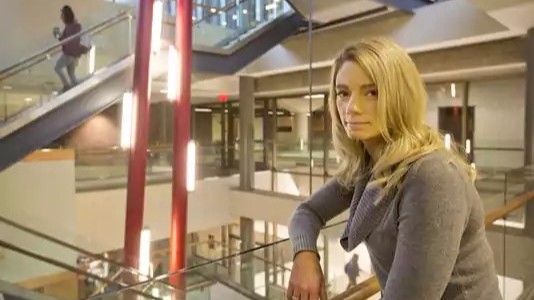LOUISVILLE, Ky. (COURIER-JOURNAL) -- Tara Moseley was in her early 20s, homeless and addicted to opioids for nearly a year when she walked into The Healing Place in Louisville.
Her drinking had escalated after high school and she had stopped going to class two weeks into college. A broken leg led to a five-month opioid prescription and that led to a physical dependence on pain pills. When pills became scarce on the street, she switched to heroin.
She needed a bed the day she showed up at The Healing Place and agreed to go through detox. After that, when the staff suggested she try their residential recovery program, she said yes.
“I knew that the life that I was leaving definitely wasn’t something I wanted to go back to," she explained. "If I left there, there was homelessness and nowhere to go."
She found a community at The Healing Place that gave her hope and kept her motivated. It's been more than five years, and Moseley — now 30 years old and a student at the University of Louisville — said she hasn't had any relapses.
"I never thought that I would be back in college," she said. "Coming from a homeless shelter to now — it’s life-changing.”
In the early stages of her recovery, Moseley needed someone to lean on all the time. She lived at The Healing Place with other women who were struggling with addiction, and they supported each other. They took classes on substance use disorder and basic life skills together, did chores and other jobs on-site together, talked through their troubles together.
Moseley completed the program in 10 months. But her recovery wasn't over, and she decided not to rush it.
“It’s not about being where that person is or where I think I should be," she said. "It’s about striving for better."
She still needed the support of the community she had found, so she spent most of the next year living at The Healing Place. She started taking classes at Jefferson Community and Technical College and ultimately moved into transitional housing, where she lived with other women in recovery.
"I did not want to move out on my own," she said. "That horrified me ... I was taking baby steps."
Eventually, though, she got a new job and decided to get her own place. It was scary, but it was time.
So she rented an apartment with a friend. Four months later, she got laid off.
That could have been her spiral moment — the bad luck that leads to a relapse.
But she had a support system, and The Healing Place had taught her that it's OK to lean on someone else.
"Because I called somebody and I was like crying, sobbing on the phone, you know, and was just so upset thinking that life was over and I had screwed up everything," she said. "They just comforted me and said, 'You know what? It’s OK. Just get up tomorrow and go look for a job.' ”
She started filling out applications and ended up getting hired as an assistant at a law firm.
"And it was like in that moment that I realized that my life had changed and that I wasn’t that person anymore," she said. "Because before I could never have gotten a job like that. I couldn’t have even shown up to a job like that, you know?”
Today, Moseley is studying political science at U of L. She plans to go to law school — her childhood dream — and wants to work in government.
"I’m working on something that I wanted to do when I was like 4 or 5, you know, in kindergarten talking about what you want to be when you grow up," she said.
Moseley has become a staunch advocate for people who struggle with addiction as well.
A couple of years ago, she launched a Louisville chapter of Young People in Recovery, a national organization that links people grappling with substance abuse to community resources. She said she works for Young People in Recovery now as its program manager for Kentucky and plans to launch chapters in other towns.
Erin Fogarty, who works for The Healing Place, said Moseley was always willing to help women who were new when she was living there. Moseley was almost like their cheerleader.
“As she progressed through her recovery, you know, she started to gain a confidence about herself and wanted to reach out and help others,” Fogarty said. “She’s very, very passionate about her recovery and not afraid to share that she is sober and that she has a past.”
Russ Read works with Moseley through the Kentucky Harm Reduction Coalition, an organization he co-founded that aims to reduce substance abuse overdoses. He sees her focus on helping others as a key to her recovery.
She is able to connect with younger people who struggle with addiction because of her personal experience, Read said. When parents call him because they're worried about their daughter, he refers them to Moseley.
"Because of her desire to help people, she will sit down with anyone, anytime and tell them her story," he said. "It's very powerful."
When she first stopped taking drugs, Moseley said she had a lot of problems with the holidays because she had damaged so many relationships. But she discovered a new kind of family: The friends she made in recovery.
It takes courage to put yourself out there and get to know someone, she said. But reaching out to people who understand what you're experiencing and want to help — whether you meet them through community organizations or a treatment program — can be monumental.
"Nine times out of 10 that person is going to be really happy that they walked up to them and said that they needed help," she said. "Being vulnerable sucks, but when you get past that initial 'this is awkward' moment ... that's when you develop these intimate friendships."
Reporter Morgan Watkins can be reached at (502) 875-5136 or mwatkins@courier-journal.com.


